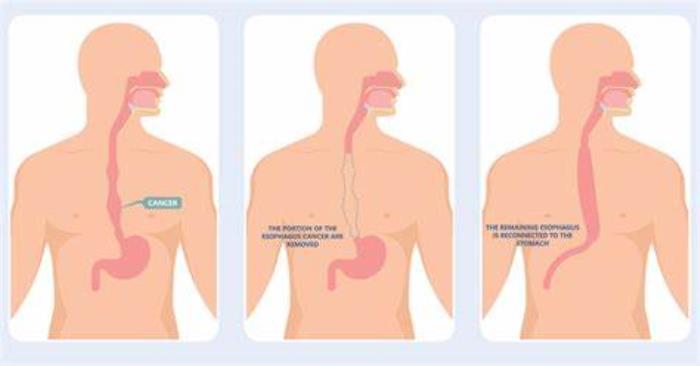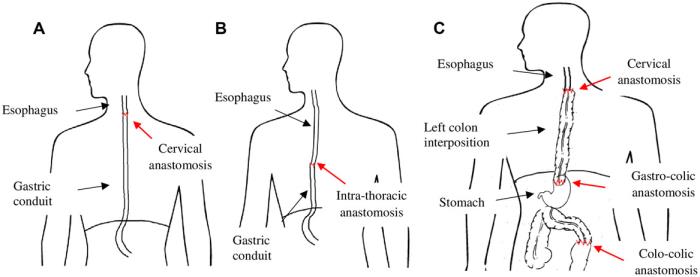Esophageal cancer treatment often necessitates surgical intervention, leading to the need for esophageal reconstruction. This complex procedure aims to restore normal swallowing function and maintain quality of life after the removal of part or all of the esophagus. Recent advances in surgical techniques and postoperative care have significantly improved outcomes for patients undergoing this challenging surgery.
Medical disclaimer: This content is for general awareness and does not replace a doctor’s consultation. For diagnosis or treatment decisions, consult a qualified specialist.
Understanding the Need for Esophageal Reconstruction
Following the surgical resection of esophageal cancer, patients may experience a range of complications, including dysphagia (difficulty swallowing) and nutritional deficiencies. As a result, esophageal reconstruction becomes crucial to restore the continuity of the digestive tract and facilitate normal food intake.
Traditional Methods of Esophageal Reconstruction
Historically, esophageal reconstruction involved techniques such as gastric pull-up or jejunal interposition. These methods aimed to replace the resected esophagus with segments of the stomach or small intestine, respectively. While effective, these traditional approaches presented challenges, including complications related to anastomosis and donor site morbidity.

Emergence of Minimally Invasive Surgical Techniques
Recent years have seen the emergence of minimally invasive surgical techniques for esophageal reconstruction. Techniques such as laparoscopic surgery and robot-assisted surgery have reduced recovery times and postoperative complications, allowing for quicker patient rehabilitation and improved surgical precision.
Innovations in Tissue Engineering for Esophageal Reconstruction
Tissue engineering has introduced novel approaches to esophageal reconstruction. Utilizing biomaterials and stem cells, researchers are developing artificial esophageal grafts that can promote regeneration of the esophageal lining, potentially reducing the need for extensive surgical interventions.
Advancements in Surgical Techniques and Technologies
Advancements in surgical techniques, including transoral robotic surgery and enhanced recovery after surgery (ERAS) protocols, have improved patient outcomes. These methods focus on minimizing tissue trauma and optimizing postoperative care, which can facilitate faster recovery and reduce hospital stays.
Importance of Multidisciplinary Care in Esophageal Reconstruction
A multidisciplinary approach involving surgeons, oncologists, nutritionists, and rehabilitation specialists is essential for successful esophageal reconstruction. This collaborative care model ensures comprehensive management of patient needs, addressing both the physical and emotional aspects of recovery.
Postoperative Care and Rehabilitation Strategies
Effective postoperative care is vital for patients undergoing esophageal reconstruction. Strategies may include pain management, nutritional support, and swallowing therapy. These interventions help to enhance recovery and improve the overall quality of life for patients post-surgery.
Long-term Outcomes and Quality of Life After Reconstruction
Long-term outcomes for patients who undergo esophageal reconstruction vary, but many report significant improvements in quality of life. Factors influencing these outcomes include the extent of the surgery, the patient’s overall health, and adherence to postoperative care protocols.

Challenges and Complications in Esophageal Reconstruction
Despite advancements, challenges remain in esophageal reconstruction, including complications such as leakage at the anastomosis site, strictures, and recurrent dysphagia. Awareness and early identification of these complications are crucial for timely intervention and management.
Future Directions in Esophageal Reconstruction Research
Ongoing research in the field of esophageal reconstruction focuses on improving surgical techniques, exploring biological scaffolds for tissue regeneration, and enhancing patient outcomes through personalized medicine. These innovations hold promise for further advancing the field and improving patient care.
Patient Education and Informed Decision-Making
Educating patients about the esophageal reconstruction process is essential for informed decision-making. Providing comprehensive information about treatment options, potential risks, and expected outcomes empowers patients to participate actively in their care.
Role of Nutrition in Recovery After Esophageal Reconstruction
Nutrition plays a critical role in the recovery process following esophageal reconstruction. Patients often require a tailored nutritional plan to address specific needs, promote healing, and ensure adequate caloric intake, which is essential for recovery and overall health.
Psychosocial Support for Patients and Families
Psychosocial support is crucial for patients and their families navigating the challenges of esophageal cancer treatment and reconstruction. Access to counseling services and support groups can help address emotional and psychological needs, fostering resilience and coping strategies.
Comparative Effectiveness of Different Reconstruction Techniques
Comparative studies of different esophageal reconstruction techniques reveal varying effectiveness and complication rates. Understanding these differences is essential for surgical planning and patient counseling, ensuring that the chosen method aligns with individual patient needs and circumstances.
Impact of Esophageal Reconstruction on Survival Rates
Research indicates that successful esophageal reconstruction can positively impact survival rates in patients with esophageal cancer. By restoring digestive function and improving nutritional intake, these procedures may contribute to better overall health and longevity post-surgery.
Technological Innovations in Surgical Equipment
Technological advancements in surgical equipment, such as high-definition imaging and energy-based devices, have enhanced the precision and safety of esophageal reconstruction surgeries. These innovations allow surgeons to perform complex procedures with greater accuracy and reduced risk of complications.
Esophageal Cancer and Its Impact on Breathing and Digestion
Esophageal cancer can significantly affect critical functions like breathing and digestion. Esophageal cancer and its impact on breathing and digestion examines how tumor growth and treatments can interfere with these processes and discusses available medical approaches to manage these complications effectively.
Managing Swallowing Difficulties in Esophageal Cancer Patients
Swallowing difficulties are a common challenge for esophageal cancer patients during and after treatment. Managing swallowing difficulties in esophageal cancer patients provides insights into therapeutic interventions, dietary modifications, and rehabilitation techniques designed to improve quality of life.
Role of Clinical Trials in Advancing Esophageal Reconstruction Techniques
Clinical trials play a pivotal role in advancing esophageal reconstruction techniques. Participation in these trials allows patients access to cutting-edge therapies and contributes to the broader understanding of effective treatment modalities, ultimately benefiting future patients.
Best Esophageal Cancer Treatment in India
The Best Esophageal Cancer Treatment in India involves advanced techniques such as minimally invasive esophagectomy, chemotherapy, and radiation therapy for effective cancer management.
Best Esophageal Cancer Specialists in India
The Best Esophageal Cancer Specialists in India have extensive experience in treating esophageal cancer, offering tailored treatment plans and compassionate care to achieve optimal outcomes.
FAQs About Advances in Esophageal Reconstruction
What are the latest advancements in esophageal reconstruction?
Recent advancements include minimally invasive techniques, tissue engineering, and improved postoperative care protocols, which enhance recovery and reduce complications.
How do surgical techniques impact recovery after esophageal reconstruction?
Surgical techniques such as robot-assisted surgery can minimize tissue trauma, leading to shorter recovery times and fewer complications, thereby improving patient outcomes.
What role does nutrition play in recovery after surgery?
Nutrition is vital for recovery, as it supports healing and ensures adequate caloric intake. A tailored nutritional plan can significantly enhance recovery after esophageal reconstruction.
Are there risks associated with esophageal reconstruction?
Yes, risks include complications such as anastomotic leakage, strictures, and recurrent dysphagia. Awareness and early intervention are critical to managing these risks effectively.
How can patients prepare for esophageal reconstruction surgery?
Patients can prepare by educating themselves about the procedure, discussing concerns with their healthcare team, and following preoperative instructions regarding diet and medications.
Discover the Best Oncologists and Cancer Hospitals in India
When it comes to cancer treatment, finding the right specialist and hospital can make a significant difference in the outcome. In this blog, we have compiled a list of the top oncologists and cancer hospitals across major cities in India, ensuring that you have access to the best care available.
Top Oncologists in Major Cities
For those seeking expert oncologists, we have identified the best specialists in key cities:
Leading Cancer Hospitals
In addition to finding the right specialist, choosing the right hospital is crucial for comprehensive cancer care. Here are the top hospitals in major cities:
Get more indepth information on Cancer treatments and their costs
Conclusion
Finding the right oncologist and hospital is the first step in your cancer treatment journey. Explore the links above to learn more about the top specialists and hospitals in your area.